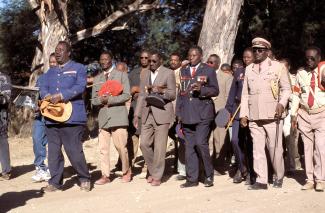Dealing with the past
Colonial shadows

Every nation needs to come to terms with the past before its thoughts can turn to the future. Germany, with its traumatic 20th century history, has done a great deal of soul-searching, but it still fails to take full responsibility for its colonial past. All guilt the nation acknowledges to date relates to the Nazis, the Holocaust and World War II.
It is all but forgotten in Germany that this country’s colonial troops brutally waged war in what was then German South-West Africa. Germans today tend to consider their country’s colonial history as just a minor aspect of Europe’s imperialist expansion throughout the world.
The descendants of the German soldiers’ victims in Namibia, however, see things in a rather different light. They remember the spirit of Kaiser Wilhelm’s notorious "Hun speech", calling on soldiers dispatched to suppress the so-called Boxer Rebellion in China to “exterminate the brutes”. His demand reflected the violent nature of the times, which were certainly not "good old days".
In German South-West Africa, confrontations of the colonial power with colonised people escalated into mass extermination from 1904 to 1907. According to a UN report, this amounted to genocide. Tens of thousands of Herero, Nama, Damara and Bushmen who wanted to preserve their lifestyles were killed or made destitute. Scorched earth policies caused an even greater loss of lives in German East Africa – which is mostly Tanzania today. The atrocities there were mostly committed by Askari mercenaries.
In 1990, after a decades-long struggle, Namibia became a sovereign state. Until today, German-Namibian relations are overshadowed by the colonial history. Its traces are seen not only in monuments and other architectural remnants but also – and more conspicuously – in the economic and cultural influence of the local German-speaking minority.
German-Namibian relations were additionally sensitive because there were two Germanies for many years. Communist East Germany – the German Democratic Republic (GDR) – supported the anti-colonial liberation struggle of SWAPO, Namibia’s dominant political party today. But the GDR ceased to exist when Namibia gained independence. Ever since, SWAPO has been dealing with the Federal Republic (FRG), a western country that SWAPO leaders view with suspicion. But the FRG has always insisted to be the only legitimate Germany, so it must face the nation’s colonial history.
"Special historical responsibility"
When Namibia became independent, the German Bundestag acknowledged that Germany had a "special historical responsibility" for the former colony. This statement has since been repeated on many occasions. As a consequence, relatively large sums of money have been transferred as development aid. German authorities consider such payments a kind of compensation for the colonial past.
Nonetheless, every German government has so far refused to acknowledge that the action of the colonial army amounted to genocide. Money is part of the problem, although the scale of financial compensation would be fairly minor, for instance in comparison with recent euro rescue programmes. It is obvious, however, that any admission of guilt would entail financial obligations – and that has been studiously avoided to date.
Perhaps the Federal Government simply does not want to set a precedent. After all the governments of Britain, France, the Netherlands, Portugal, Spain, Belgium and Italy face similar historic challenges. Once it is accepted that colonial injustice deserves compensation and not merely apologies, the floodgates will open for claims in many similar cases. The United States, Canada, Australia and other former settler colonies would in principle also be exposed, with indigenous people demanding compensation for genocide.
In Namibia, the descendants of the victims of the atrocities have never heard any real admission of guilt. Germany is the country’s most important aid donor, but it remains an unpopular partner. The present generation of the victimised ethnic groups sees development aid as just a feeble attempt to make amends – and one that does not relate to them, but only to the two governments involved.
It matters that that the ethnic groups that were persecuted under colonial rule are under-represented in Namibia’s government today. The Herero, Nama and Damara who are fighting for recognition of their claims have little political influence. Nonetheless, government agencies in Namibia are increasingly taking their side.
Germany struggles to deal with its colonial legacy. In 2011, arrangements were made for the first-ever repatriation of skulls that the colonial power had sent to German universities for racist research from 1904 on. But the solemn handover ceremony in Berlin ended in outrage. The Namibian delegation felt snubbed. Its head was Kazenambo Kazenambo, the minister of youth, national service, sport and culture. He belongs to one of the persecuted ethnic groups, and was upset because his counterpart was not a cabinet member, but Cornelia Pieper, a junior minister from the foreign office. It made matters worse that she left the ceremony early after some heckling.
There are many more African skulls in university repositories in Berlin, Freiburg and Greifswald – and possibly other German cities. Acknowledgement of the genocide will be important to make future repatriations a success. Accepting guilt is the prerequisite for coming to terms with the past and for improving German-Namibian relations.
On 22 March 2012, shortly after the 22nd anniversary of Namibia’s independence, the Bundestag once again discussed German-Namibian affairs, debating motions that were submitted by the Social Democrats and the Greens on the one hand and the Leftists on the other hand. The debate lasted only half an hour. Legislators’ interest in the much-emphasised "special historical responsibility" is apparently quite limited, and the government coalition rejected all proposals made by the opposition parties.
It was good, nonetheless, that the joint motion of Social Democrats and Greens went beyond any position they adopted while they shared power in a coalition government from 1998 to 2005. That said, it was disappointing that the opposition parties submitted two separate motions after failing to reach a common position even though they broadly agree on substantial issues. The only fundamental difference was that the Left Party insisted on an obligation for financial compensation. On the upside, should any Social Democrats or Greens join the Cabinet after the next general election due later this year, they will have to take their cue from the 2012 motion.
Even more than a hundred years on, history will not sort itself out by itself. The issue of colonial atrocities will not go away. Fortunately, an alliance of civil society groups in Germany is devoting itself to coming to terms with colonial history in Africa. Its achievements include successful campaigns to rename streets that previously bore the name of colonial-era criminals. For instance, Munich’s Von-Trotha-Straße has become Herero-Straße, Stuttgart’s Wissmannstrasse became Wolle-Kriwanek-Strasse and Berlin’s Gröbenauufer was renamed May-Ayim-Ufer.
Henning Melber is director emeritus of the Dag Hammarskjöld Foundation in Uppsala and extraordinary professor at the University of Pretoria. From 1994 to 2000 he was chair of the Namibia-German Foundation for Cultural Cooperation (NaDS) in Windhoek.
henning.melber@dhf.uu.se










